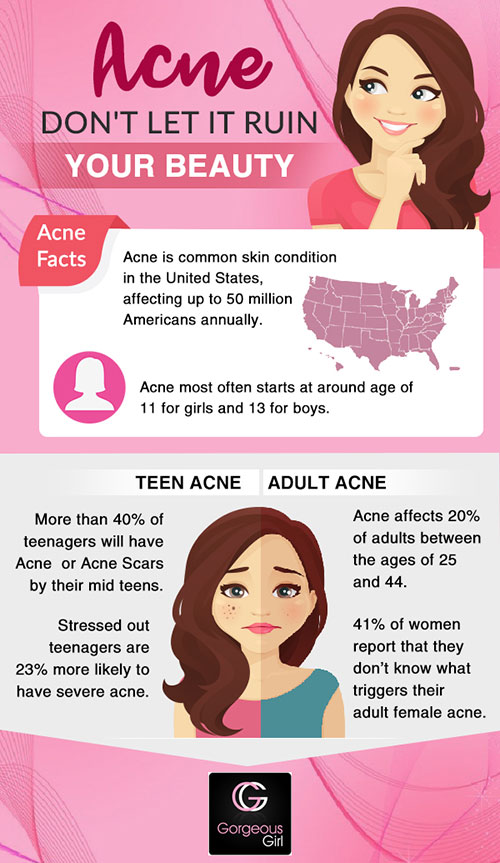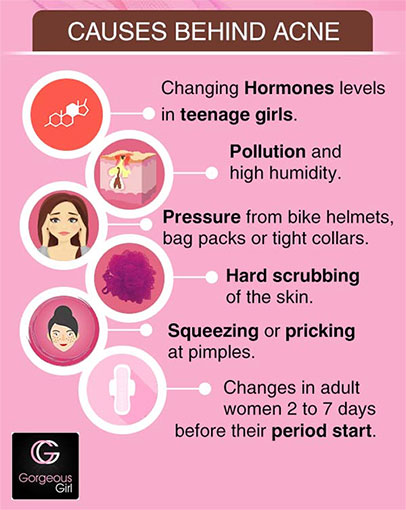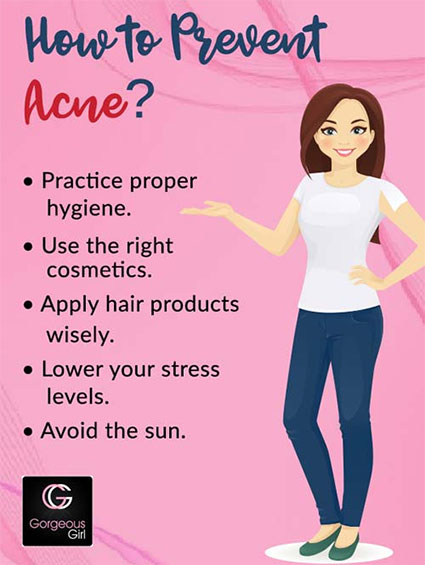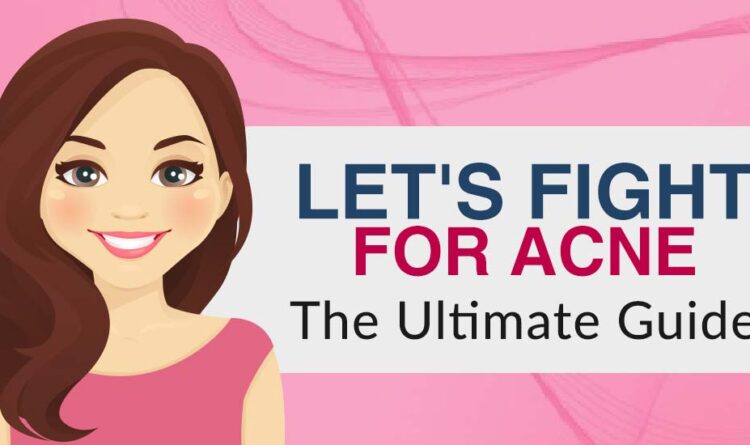Acne is one of the most common skin diseases out there, and it affects the oil glands located at the base of our hair follicles. Common symptoms of acne include whiteheads, blackheads, papules (small, tender red bumps) and pustules (papules that have pus at their ends).
Although acne is not a life-threatening condition, it can leave scars which can affect the self-esteem of people suffering from it. That’s why many people are dying to find out on how they can deal with this condition and that is exactly what we are going to talk about in this article.

The Culprits Behind the Dreaded Acne
We need to know what causes acne before we can find a way to address it, right? We will be honest with you here. The truth is, no one knows yet what is the sure cause of acne, even the experts. But they do have some theories. Here are some of them:

- Hormones – One of the primary causes of acne is a rise in androgen levels in the body, and it usually occurs during puberty. The high androgen levels may cause oil glands to grow, causing it to produce more oil which may lead to the breakdown of cellular walls that causes bacteria to grow in the pores resulting in acne.
- Bacteria – The truth is, P. acnes (the bacteria causing acne) is present in everyone’s skin, and it will cause acne breakouts when your skin overproduces sebum or when the sebum gets trapped in the hair follicles and does not get sloughed off properly. Since the bacteria feeds off sebum, too much sebum in the skin can create a fertile ground for the bacteria to grow more leading to acne breakouts.
- Cosmetics – There is such a thing we call cosmetically related acne, and it is caused by makeup products, sunscreen, lotions and other skin care products that clog the pores.
- Poor Skin Barrier Function – Red, flaky, stingy, itchy and overly dry skin is vulnerable to acne. When your skin is dry, it has poor barrier function, so it does not do a good job protecting itself from the bacterial invasion that causes acne.
Risk Factors for Acne You Should Be Aware of
Wondering why some people get acne why others don’t? Well, that’s because there are factors that can increase your risk of having acne breakouts. Here are some of them:
- Genetics – Yes, acne is hereditary because genetics dictate your immune system’s response to bacteria, how easy your pores get plugged and the type of skin you will have. So if the majority of the members of your family have fallen victim to acne, it is most likely that you will be too.
- Environmental Factors – Being exposed to dust, dirt, oil and grease can increase your chances of having clogged pores. On the other hand, humidity and heat can boost oil production. And as we all know, the combination of clogged pores and overproduction of oil is a recipe for acne disaster.
- Stress – When you are stressed out, your body releases higher amounts of cortisol and androgen which causes the skin to produce more oil which increases your risk of acne.
- Personal Hygiene Habits – The type of skin care and cosmetic products that you use can increase your chances of having acne. Hair products may block pores causing acne to develop in your forehead and around your hairline while the wrong cosmetics and skin care products may block pores causing the development of whiteheads and blackheads.
- Medications – There are medications may change the body’s hormone levels and chemistry which may result in acne breakouts. These medications are those that contain Lithium, corticosteroids, and androgen.

How to Prevent Acne?
To tell you the truth, there is no sure way on how you can prevent acne. But since we already know the risk factors of acne, you can find a few ways on how you can lower your risk of experiencing acne breakouts. Here are some tips on how to get rid of acne fast:
- Practice Proper Hygiene – Washing your face is essential as it can prevent sweat and other pollutants from clogging your pores. Aside from using a regular cleanser, you should also consider using a facial scrub as this can help unclog the pores. However, you should avoid over washing your face to prevent further skin irritation and dryness.
- Use the Right Cosmetics – When choosing cosmetics and skin care products, opt for the ones labeled noncomedogenic or nonacnegenic because it means that they will not clog your pores.
- Apply Hair Products Wisely – When using styling gel or hairspray, try to apply them as far from your face as possible. Also, opt for water-based hair products since oil-based ones may increase your chances of having acne.
- Lower Your Stress Levels – To prevent stress (and acne) at bay, it is recommended that you get enough sleep, exercise regularly and do activities that calm you down like meditation and yoga.
- Avoid the Sun – Prolonged sun exposure can help shed off dead cells which may plug your pores that may result to blackheads so try to avoid the sun as much as possible.

How to Treat Acne? The Best Ways to Deal with Acne!
There are lots of treatments for acne in the market today. Some works while some don’t. We are here to help you find the best acne treatment for your needs.
- Topical Medications – Topical medications for acne often come in gels, lotions, and creams. The most common types are retinoids (which prevents clogging of hair follicles), antibiotics (reduces redness and kills off excess bacteria in the skin) and dapsone (often used in combination with retinoids).
The effects of this treatment may take a few weeks to be noticeable. Possible side effects include dryness, peeling, and redness. - Oral Medications – Some of the oral medications that your dermatologist may recommend include antibiotics (for mild to moderate acne), Isotretinoin (for severe acne), oral contraceptives and anti-androgen agent (for hormone-related acne).
- Dermatological Procedures – If you are in a hurry to get rid of acne and you have money to spare, these procedures are the best solutions for you. The most common dermatological procedures for acne are light therapy, chemical peel, whiteheads and blackheads extraction and steroid injection.
Keep in mind that each procedure may come with corresponding side effects and it can be employed alone or used in conjunction with medications.
How to Find the Best Acne Cream (Discover The Must Have Ingredients Here!)
The most accessible acne treatment that you can use is the acne cream. But how do you know which ones are effective and which aren’t? Well, here are some of the ingredients you should look for when choosing an acne cream:
- Retinoids – Retin-A and Retinol decrease skin inflammation and promotes exfoliation, preventing future acne breakouts. On the other hand, tretinoin can reduce oil production and address the dark skin stains caused by acne.
- Tea Tree Oil – This oil has excellent anti-inflammatory and antibacterial properties that soothe skin and calm acne. This works almost as well as benzoyl peroxide but it a lot gentler to the skin.
- Benzoyl Peroxide (Low-Dose) – This ingredient works by killing the bacteria that causes acne, making it one effective treatment for acne. However, too much of it can be harmful to the skin. That’s why you should choose an acne cream that contains no more than 3 percent of this ingredient.
- Alpha Hydroxy Acids – AHA’s have amazing exfoliation properties useful for sloughing off dead skin cells that clog the pores. Some of the AHA’s that are found in acne creams are lactic and glycolic acid.
- Salicylic Acid – As a beta-hydroxy acid, this ingredient works the same way as AHA’s, but this is a lot better tolerated by the skin than glycolic acid.
- Ingredients That Soothe the Skin – If you are an adult, your acne tends to last longer meaning you will have to use acne cream a lot longer and it may lead to skin irritation and dryness. To protect the skin, you would need a cream that has soothing ingredients like witch hazel and shea butter.

Will Acne Return After Treatment?
The sad truth is, your acne may return after it has been treated. That is most especially true if you have not stopped your bad habits or you have not fully addressed the cause of your acne breakouts. If you wish to keep acne at bay, it is recommended to getgood acne treatment and start taking care of your skin and follow the tips that we have mentioned above on how to minimize your chances of experiencing acne breakouts.
Conclusion
Acne breakouts can be the worst thing that can happen to you. It may cause you to feel ugly, have low self-esteem and may even push you to shy away from socializing with people. If you want to get your life back and be the beautiful, energetic and wonderful person that you are meant to be, you need to find a way to deal with acne—you need to get an acne treatment!
All of the acne treatments that we have mentioned above are already tried and tested by people who have suffered from acne breakouts worldwide and they can attest as to how effective they can be. If they can get rid of acne and take charge of their life and how they look, you can too! Try any of these acne treatments now and enjoy an acne-free life!






